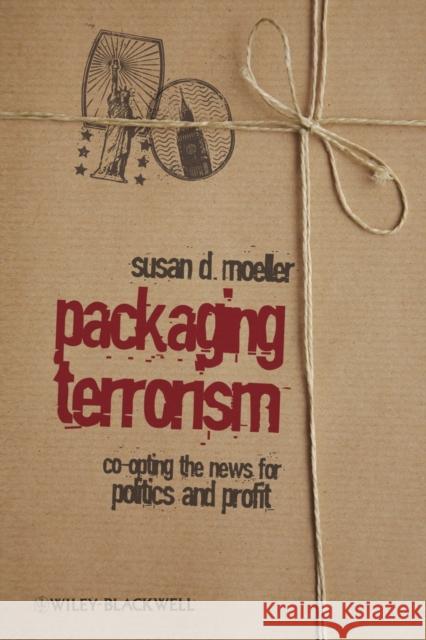Packaging Terrorism » książka



(netto: 97,95 VAT: 5%)
Najniższa cena z 30 dni: 101,39
ok. 30 dni roboczych.
Darmowa dostawa!
Packaging Terrorism investigates how American media have identified and covered international terrorism and violence since September 11, 2001.
- Compares US coverage with that of British and Arab media
- Discusses the priorities, assumptions, political debates, deadline pressures and bottom-line considerations that will continue to influence coverage in the future
- Suggests how terrorism could be better covered by the media going forwards
"The book is engaging and should be of interest to academics and general readers alike." (
CHOICE, November 2009)
The book is well–written, very informative, and engagingly convincing. Moeller develops a compelling argument on how politicians and media corporations package terrorism to attain political and economic ends. Moeller s book can resonate with various kinds of readers. In fact, many readers might find the book to be one of the best analyses of the media s coverage of terror. (
International Journal of Communication, 2009)
Susan Moeller trains her scholarly eye on the role of the media in our understanding of modern–day terrorism. She has produced a valuable, important, and timely study essential reading for all of us.
Marvin Kalb, Edward R. Murrow Professor Emeritus at Harvard University
A sober and timely analysis of the toxic mix of politics, terrorism, and the media since 9/11. Moeller lays bare the price paid by the West, but also points to a better way forward.
Richard Sambrook, Director, BBC Global News
Packaging Terrorism is an urgently needed meditation on how journalism has too often failed to ask the hard questions about the War on Terror and become instead a weapon of propaganda. Susan Moeller s timely book is a must–read for all concerned journalists and citizens.
John Owen, Professor of International Journalism, City University, London
An outstanding in–depth analysis of one of the most difficult and controversial issues in modern journalism. Moeller critically dissects the roles of government and media, laying bare the spin, manipulation of language, and vested interests that all too often distort the true story and deceive the public.
Stephen Jukes, Dean of the Media School at Bournemouth University; former Global Head of News at Reuters
If you need a thoughtful, thorough, and challenging survey of recent media treatment of terrorism, then this is it. Susan Moeller is a clever and realistic analyst of how journalism treats this vital subject. She has both an insider s understanding of the media and the intelligence and research to mount a critical attack on those who misrepresent the true nature of political violence.
Charlie Beckett, London School of Economics; Director, POLIS
Susan Moeller has exploded a bomb, splintering the War on Terror. This thoroughly researched book provides an X–ray image of the US and British media as they have grappled with reporting the news of terrorism and war. It is a stinging rebuke of this largely profit–driven profession and also a primer for students of journalism on how to cover war and violence to make us better informed citizens in a democracy.
Nayan Chanda, Yale Center for the Study of Globalization
1. What is Terrorism?.
Introduction: A Very Simple Idea.
Are You Ready.
Words and Trojan Horses.
Political Correctness: can I use the word terrorist ?.
Why Do News Standards Matter.
What is Terrorism?.
2. How is Terrorism Covered?.
The Politics of Coverage.
Making Terrorism the Big Story .
Tragedy and Politics: What We Hear, Why We Hear It.
The Voices of the Powerful.
When Caring About Victims Sells News.
Parsing the Difference Between Terrorism and War.
Co–opting the News / Co–opting the Public.
The Stories That Are Told.
Why Some Media Do a Better Job.
3. What Are the Images of Terror?.
The Politics of Images.
When Did Pictures Start to Matter?.
It s No Time to Be Squeamish : The Jumpers at the World Trade Center.
The Public s Picture of the Year : The Flag–Raising at Ground Zero.
Is American Blood More Precious Than Iraqi Blood? : Ali Abbas and Pfc. Jessica Lynch.
Terrorists Want an Audience, Too: Daniel Pearl, Nicholas Berg and Beyond.
Cleaning Up the Pictures: Madrid and Fallujah.
Losing Control of the Image: Official photos, Snapshots and Cameraphones.
What Do We Need to See? What Do We Need to Do?.
.
4. Conclusion: Packaging Terrorism.
The End.
Susan Moeller is the Director of the International Center for Media and the Public Agenda (ICMPA) at the University of Maryland, College Park.
Packaging Terrorism is the account of a very simple idea: it s not the acts of terrorism that most matter in the post 9/11 world, it s what we are told to think about the acts of terrorism. Politicians tell us what to think. The media tell us what to think. Even terrorists tell us what to think. They all want to attract our attention, and all have reasons for wanting us to think in a certain way. They all want to tell us why an act of terrorism matters. They all have agendas. They all are packaging terrorism for our consumption and we are the audience for all those disparate actors.
Terrorism has become an everyday global event in Iraq, in Israel, in India, in Indonesia, and also in the United Kingdom and United States. Packaging Terrorism investigates how Western media have identified and covered international terrorism and violence since September 11, 2001. Comparing US coverage with that of British and of Arab media, Packaging Terrorism not only explores media coverage of terrorism around the world but also explains the priorities, assumptions, political debates, deadline pressures, and bottom–line considerations that will continue to influence this coverage in the future.
1997-2026 DolnySlask.com Agencja Internetowa
KrainaKsiazek.PL - Księgarnia Internetowa









